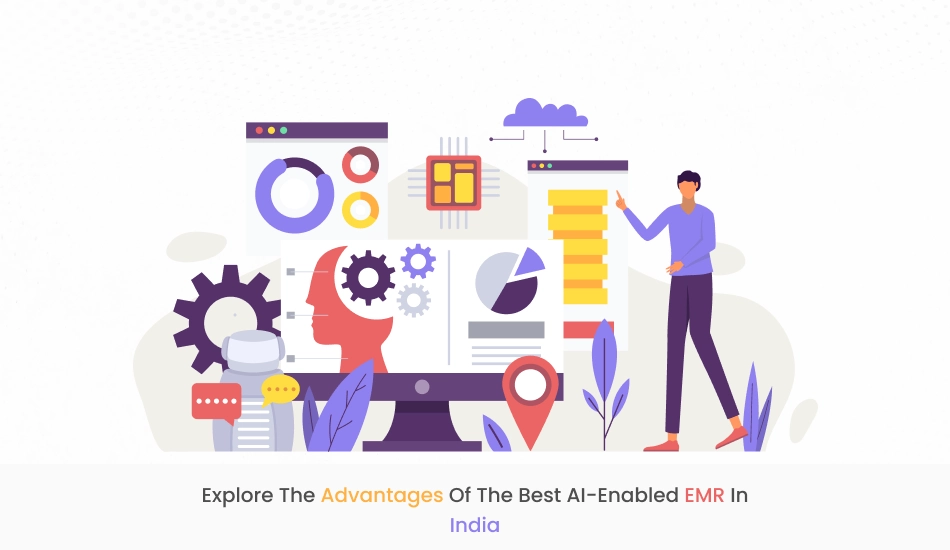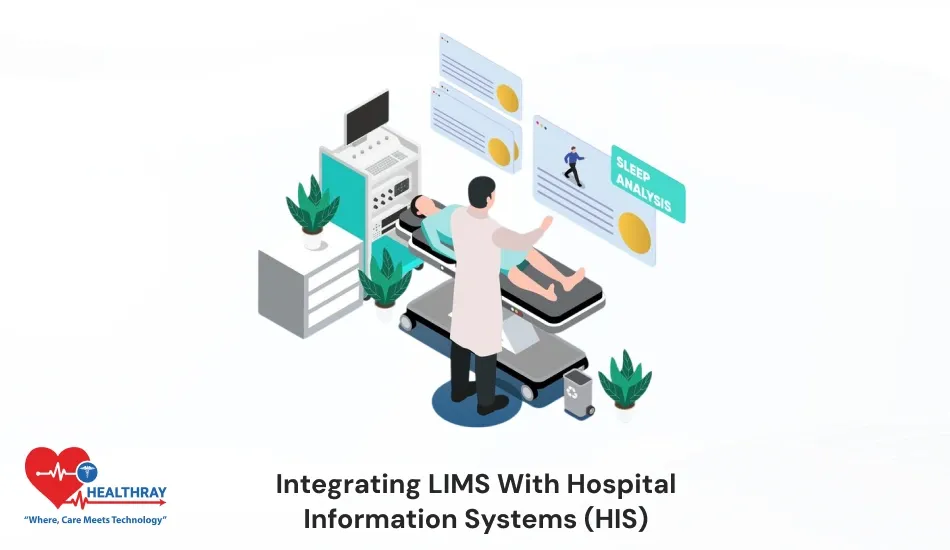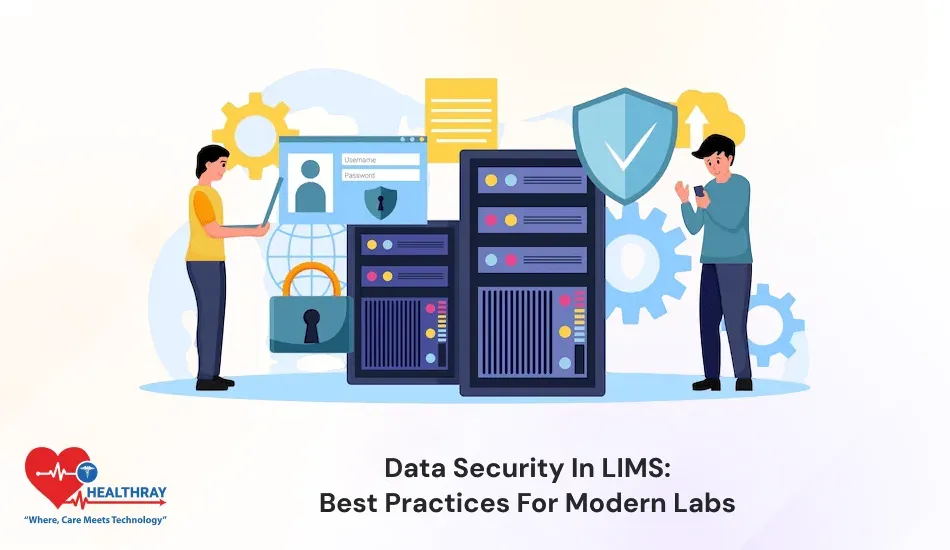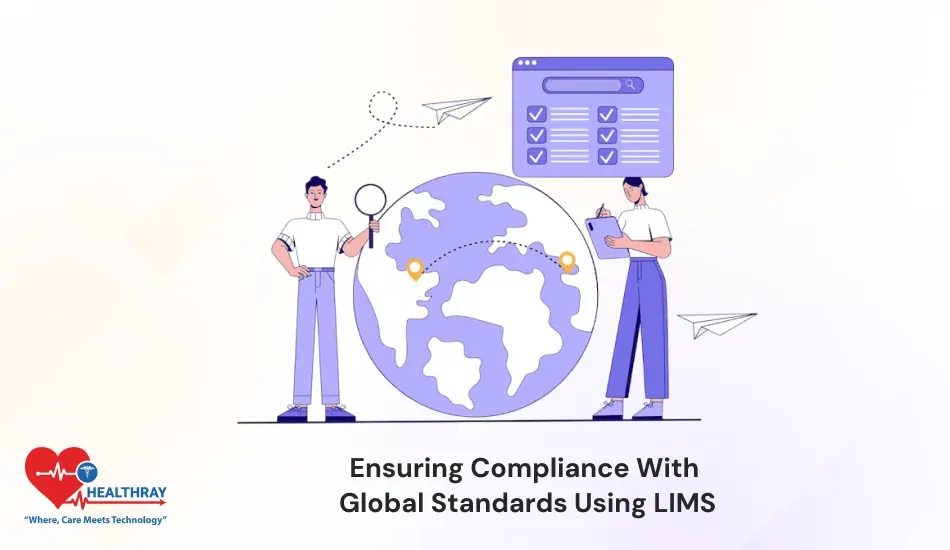Quick Summary
The infusion of Artificial Intelligence and Electronic Medical Records has a significant digital impact on the healthcare industry. Artificial Intelligence has the vast potency to collect large amounts of medical data and arranging in a structured format, which leads to navigating data easily. EMR in India providing medical intelligence reports in a unified screen that results in accurate diagnosis and assists in formulating healthcare policy through evidence-based tools. Therefore, increasing healthcare collaboration with different departments and reducing medical costs.
Overview of AI- Enabled EMR
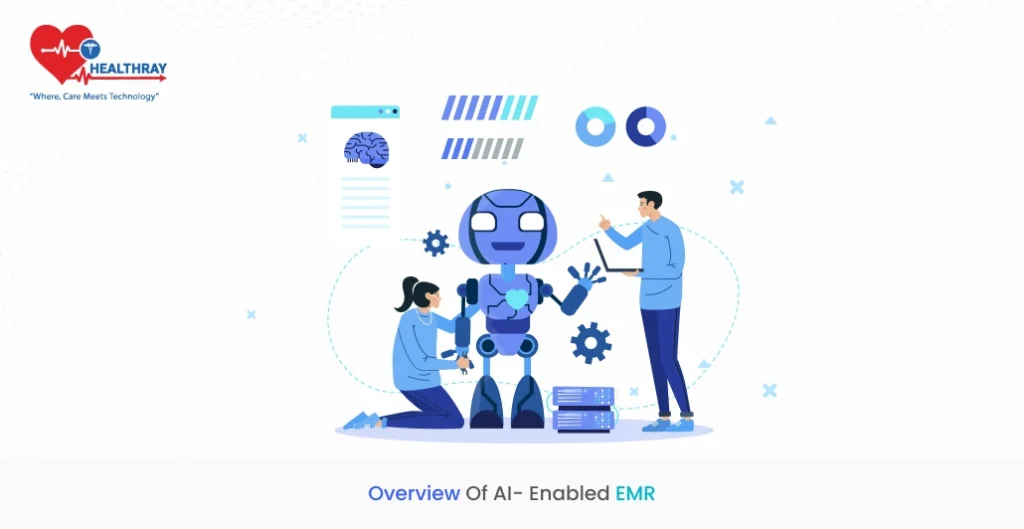
Electronic Medical records blend with artificial intelligence for better hospital infrastructure and incorporate remarkable digital tools to draw meaningful conclusions. Fostering clear data interpretation for utilizing resources effectively and increasing patient participation in their medical activities. Optimizing administrative tasks including appointment scheduling, reminders, patient registration, and records whole medical documents. Furthermore, It incorporates medical billing, insurance processes, and managing patient records with their details. Through the EMR Software platform, patients receive from time to time notification of their healthcare activity and medication reminders.
AI-enabled EMR in India eliminates paper-based documents for maintaining sustainability and preservation of natural resources. Consequently, it saves energy and minimizes waste. Requires no storage facility which reduces hospital costs and increases patients’ experience. AI digital tools create better data management and enhance the capability of forecasting chronic diseases. Enhancing collaboration among healthcare providers and patients. Also, supports extending hospital services and creates an electronic medical setup without requiring additional investment. With the Electronic Medical Record (EMR/EHR) solution, it’s easy to maintain individual patient information and the confidentiality of their medical information. Consequently, patients embrace the concept of digital healthcare and maintain a healthier lifestyle.
Features of Electronic Medical Records
Electronic Medical Records act as a digital guardian for patient and hospital information. Artificial Intelligence lights up the healthcare industry and modernizes medical facilities. Supports in reaching medical access to remote areas and other areas, where it’s difficult to have medical facilities. Virtual consultation helps to treat patients from remote locations at any time. AI medical technologies offer consolidating hospital data including inventory information, clinical information, and medical financial reports with detailed vendor transactions. There are numerous features of Electronic Medical Records including :
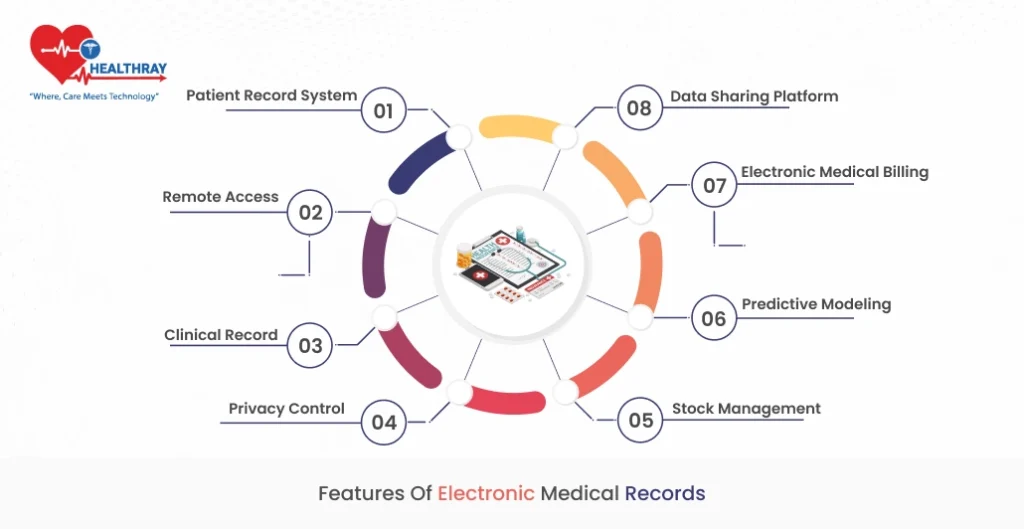
Patient Record System :
Electronic Health Records manage patient records in an effective manner, which is easy to navigate and enters whole patient healthcare data with demographic details. Also, recording insurance details with medical history. Provides integration with different medical departments such as laboratory management systems, pharmacy management systems, and different specialists. Patients receive reminders regarding medicine and getting notifications after each medical activity. Therefore, patients are more serious about their health and make timely decisions whenever required.
Whole medical billing transactions are recorded in a unified platform which simplifies the insurance verification process. Also, receiving faster claims and maintaining a steady flow of revenue. Facilitate consolidation of medical transaction information that helps in formulating medical budgeting and effective strategies for reducing expenses. Patients can view their health-related information from anywhere at any time which leads to taking proactive actions for fast curing the disease.
Remote Access :
EMR software provides virtual consultation, which is beneficial for healthcare providers and patients. Patients have access to view their medical information or radiology images and they can understand the reports. Therefore, they have full control of their health and change their lifestyle as required. Patients can easily book appointments and receiving timely medication reminders leads to speeding up the recovery process. They save lots of time with no breaks in their business operations. Consequently, helps in taking their family members and maintains a healthier environment. With Computerized provider order entry, easy to visualize and analyze their medical financial transaction, formulate the evident proof budget, and aid in making financial management decisions.
Medical professionals help in overcoming numerous challenges from remote access as it’s difficult to find time for patient care and analyzing reports in depth. Difficult to share radiology reports and it’s too time-consuming. Additionally, following entire healthcare regulations is hard and also difficult in prescription management remotely. In contrast, it’s more convenient with Healthray’s EMR software which has wide functionalities. Aids in persistent interaction with healthcare providers and enhancing patient care. This helps in addressing healthcare challenges and wide capabilities to adopt modern-day healthcare technology.
Clinical Record :
In modern healthcare organizations, it’s vital to adopt the latest technology to cope with the environment and always be ahead of your competitors. In the traditional medical system, it’s too complex and time-consuming. Maintaining individual patient records and receiving medical reports at the right time is difficult. Whereas digital clinical notes maintain systematic documentation and require less time to formulate clinical documentation.
Electronic Medical Record Systems adhere to entire medical regulations which eradicate the need for legal counsel. Consequently, saves a lot of money and effort in recruiting suitable legal advisers. Medical records incorporate information such as patient information with their medical history, test results, and previous medication process with vital signs, which supports accurate prescription and diagnosis. Moreover, healthcare providers maintain clinical notes including their observations and important aspects while examining patients.
Maintains diagnosis documents and radiology reports. Prescription management includes medicines, dosage timing, and their frequency. Additionally, maintaining progression documentation and noting any adverse patient’s condition. Consequently, minimizes medical staff workload and lowers hospital expenses.
Privacy Control :
Electronic medical record systems maintain hospital privacy and patient’s confidential information by applying various strategies. Ensures adherence to medical regulations from managing prescriptions to medication protocols. It’s a paramount functionality for every medical specialist whether it’s endocrinologists, oncologists, ophthalmology, etc. Consequently, building patient faith in healthcare organizations.
Failure to comply with medical regulations leads to reduced hospital goodwill and increasing patient attrition rate. Therefore, EHR implementation improves patient satisfaction and a steady flow of hospital income. It also protects patient’s health records and supports them in making precise decisions. Consequently, aids in computer hacking and conducting smooth hospital operations. .
Stock Management :
EHR systems manage the entire stock effectively from ordering to billing transactions. This supports tracking inventory with vendor details as maintaining electronic transactions of purchasing hospital inventory whether it’s equipment or medicines. Further, systematically organizes transactions in a ledger format. Entering the time of delivery or other quantity with other required details. Implementing an EHR system recording the medical equipment usage with their maintenance and replacement time. Consequently, maintaining optimum stock level leads to eliminating over and under-stocking situations.
Electronic Medical Records facilitate alerts regarding the maintenance and replacement time of an inventory. Also, medical staff create alerts as per their hospital requirement and receive alerts when there is a need to purchase inventory. Consequently, it reduces hospital waste and the risk to patient health. They also can apply several strategies to manage hospital inventory.
Predictive Modeling :
Electronic Medical Records store entire hospital and patient documents systematically, which turns to depict reporting information in the dashboard format for in-depth healthcare analysis. It stores data in such a format that it would be easier to extract particular data. Consequently, health information technology forecasts critical diseases and patient’s conditions after certain medications. Also, it protects from chronic diseases and knowing the required no. of follow-up after an appointment.
Electronic Medical Records forecast the number of required medical equipment and medicines for balancing the inventory level. It supports making better and faster medical decisions. Digital reports provide actionable and meaningful insights that predict upcoming medical policies and hospital financial performance. Implementing these systems eliminates over and under-staffing situations after monitoring staff assignment, recruitment details, and their performances. Consequently, allocates hospital resources effectively and enhances patient care.
Electronic Medical Billing :
Drafting medical billing is a cumbersome process in health organizations because it involves several steps and requires fulfilling the conditions of medical regulation. Formerly, it eliminates paper-based records and converts them into electronic format for ease of medical billing procedure. Consequently, it decreases hospital expenses and reduces the unnecessary workload of healthcare staff. Lower operation tasks save a lot of time and effort, leading to a focus more on patient satisfaction in healthcare organizations. It not only benefits healthcare providers but is also advantageous for patients and other medical departments.
Furthermore, patients can receive medical financial transactions and due payments on a single platform. In the traditional medical system, it’s troublesome to store each medical record and scrap the required information. EHR adoption decreases hospital expenses which are incurred in staff recruitment and increases the flow of income by faster insurance claim process. Electronic medical record systems facilitate different modes of digital payments such as debit cards, credit cards, or via UPI. for faster payment and reduce the stress of collecting large amounts of payment. In addition, It provides concise data for taking follow-up or call reminders for outstanding payments.
Automated Operational System :
Clinical data is stored in an electronic format which eases the administrative procedure from scheduling appointments, and patient registration, to medical billing transactions. Further, patients can schedule appointments for immunization dates from their homes. All clinicians are embracing electronic health records for faster treatment outcomes and increasing patient contentment. Hospital operational work tasks are a vital source for increasing hospital income.
Through EMR systems, It’s easy to conduct smooth operational activity with the required details. Consequently, it reduces human error and eliminates unnecessary work tasks. Getting notification reminders regarding appointment times and entering patient information effortlessly for better healthcare delivery.
Data Sharing Platform :
Electronic Health Record enables healthcare professionals to share patient information with other medical specialists for advice or transfer cases as it requires more specialization. This simplifies the process of conversation with the medical professionals and patient care. From Electronic Medical Records, it’s easier to share any medical documents and radiology images with other medical providers and healthcare departments. Healthcare professionals can easily treat patients from any location by sharing their healthcare information.
EMR in India eases the process of sharing patient’s medical data. It increases patients’ high quality of satisfaction with medical professionals and enhances their experience with different medical specialists. Patients receive health assistance from any location at their convenient time. Moreover, It maintains transparency and reliability of medical information. This leads to accurate treatment decisions and enhances medical knowledge among medical professionals.
E-Consultation :
Electronic Medical Records have widened healthcare service to each corner of the country and maintained a healthier environment for creating a better lifestyle and enhancing the production capacity of an individual. In the traditional healthcare system, it takes a longer process to consult with a doctor and persistent consultation with specialists might be impossible. However, patients need to interact with healthcare experts at regular intervals for fast recovery and decrease the risk of chronic diseases. This platform maintains digital records in cloud-based systems, leading to quick access to healthcare documents from anywhere.
It provides longer hours of consultation via audio, video, and messaging and facilitates a single platform for all specialists. It facilitates continual monitoring of critical diseases such as heart attack, blood pressure, thyroid, and more. Medical digital version also aids medical practitioners in consulting with other authorized providers for better quality care and enhancing their collaboration among them.
Advantages of Electronic Health records
Electronic health records have widespread adoption in the Indian healthcare industry. It’s a victory over a traditional healthcare system where there is a vast use of paper records and difficult to compile them in an organized way. Troublesome to find medical records that cause a delay in decision-making that impacts a patient’s recovery and might cause severe illness. Take a look at the below advantages for more information :
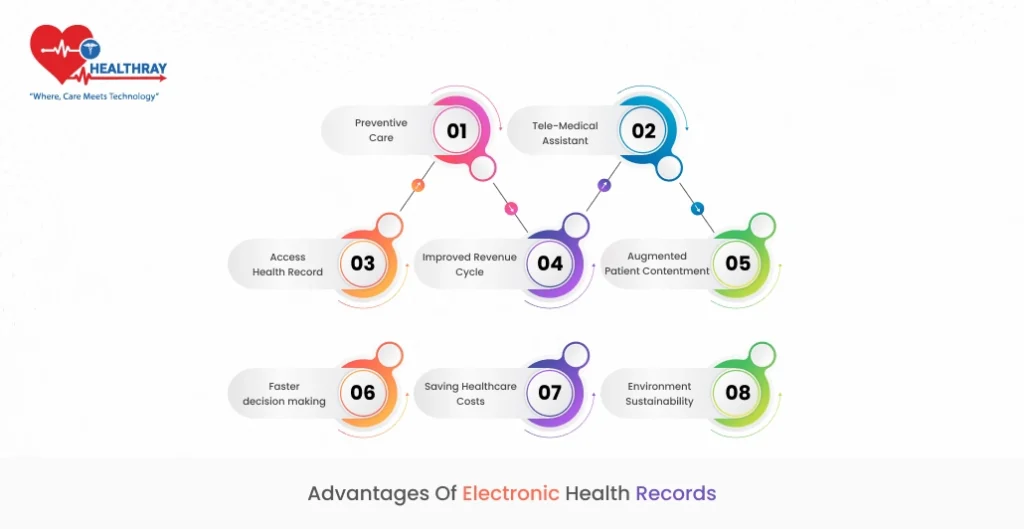
Preventive Care :
Electronic Medical Records analyze patients’ reports in more depth which helps in earlier detecting health issues or chronic diseases. It is only done with persistent monitoring of the patient’s health and maintaining a healthier routine. Consequently, it minimizes the risk of critical diseases and supports in making prior medical actions. Medical actions might be laboratory tests, and medications or doctors can suggest immunization dates. With EHR systems, it is easy to analyze whole medical documents by concise analytics dashboards in visual formats such as bar graphs, pie charts, and tabular formats. This supports predictive analysis for better patient outcomes.
Access Health Record :
Patients can access digital medical records at any time from anywhere. This platform records patient’s information with medical history and vital signs. It is more beneficial in emergencies and enhances patient care. Formerly, the EHR systems in healthcare platforms accumulated whole patient information and hospital information. After that, systematically organizing the entire information and formulating medical reports in a simplified format that can be interpreted easily. Also, medical professionals receive patients’ information from any location, and a good opportunity for them to enhance their revenue income.
Electronic Medical Records maintain medical data with adherence to healthcare compliance which are formulated by national coordinators such as the National Health Authority and National Digital Health Mission. Healthcare professionals do not have enough time to comply with each medical report and maintain it effectively. Therefore, EHR adoption is best for conducting healthcare activities.
Faster decision-making :
Electronic Medical Records help in informed decision-making for better treatment outcomes and help in patient quality improvement. Improves decision-making power through access to entire patient data with detailed information such as vital signs, medical history, test results, and allergic symptoms. It helps in quick decision-making regarding medical equipment, medicines, or patient health. Medical decisions are being made with data-driven results that lead to accurate diagnoses and prior healthcare actions. Enable medical practitioners to collaborate with other providers remotely for better decision-making.
Step towards digital era with our healthcare solution
Revamp your hospital facilities and embrace change for better healthcare management. Ease in managing and organizing large medical datasets leads to effective analysis. Seize the opportunity now!
Saving Healthcare Costs :
Electronic Medical Records reduce overall hospital expenses because whole paper-based systems turn to digital record systems. Automated operational tasks including appointment scheduling, medical billing, inventory management, and more. It reduces manual errors and eliminates unnecessary workload. Consequently, reduces the healthcare staff workload and requires less staff for conducting operational work. Radiology images are in digital format which reduces the costs and efforts for creating films. Also, compliance with medical regulations eliminates the cost of legal counsel.
Enhanced Environment Sustainability :
Electronic Health Records enable automated work tasks that eliminate the need for paper documents which conserve natural resources such as water and wood. Mainly, water is used for paper manufacturing. The medical department uses more paper for their work and documentation tasks. Also, it saves healthcare staff energy which is incurred on printing paper and maintaining paper records. Additionally, Electronic Health Records integrates with HRMS (Human Resource Management System) for recruitment, assigning tasks, and analyzing staff performance. Consequently, it also reduces the paper need and decreases transportation facilities through virtual consultation.
Augmented Patient Contentment :
Electronic Medical Records increase patient satisfaction as they provide complete solutions that address healthcare challenges and support individual specialists to create precise diagnoses and manage prescriptions effectively. Electronic Medical Records have a wide range of functionalities that heighten patient satisfaction to the next level. Moreover, it includes a patient portal that compiles all patient information with their medical details on a single platform. Ease the procedure of medical billing and foster convenient modes of payment such as debit cards, credit cards, or via UPI. It simplifies the hospital process and patients can focus more on their health. Therefore, maintains a healthier lifestyle and supports creating a habit of healthcare routine.
Improved Revenue Cycle :
Electronic Health Record is optimizing the operational process through the electronic mode of medical work. Ease in conducting administrative operations such as medical billing, reminders regarding equipment failure, reminders for maintenance time, and replacement time. Consequently, minimizes downtime in healthcare and improves the steady flow of revenue. Additionally, increases the speed of receiving claims and payments from patients. It enhances patients’ confidence and their engagement in hospitals. Integration with other healthcare providers increases revenue income without incurring any additional investment.
Tele-Medical Assistant :
Electronic Medical Records facilitate remote consultation which helps healthcare providers to consult with patients at any time from anywhere. Also, they have distinct options for consulting doctors such as video consultation, audio, and messaging. These modes can be chosen by medical providers and patients at their convenience. It serves as a medical collaborative tool that helps in sharing medical data with anyone and patients can choose their specialists. EMR platform has many specialists for remote consultation. Also, provides a facility for sharing medical documents and radiology images with any healthcare department.
The Best AI-Enabled EMR in India
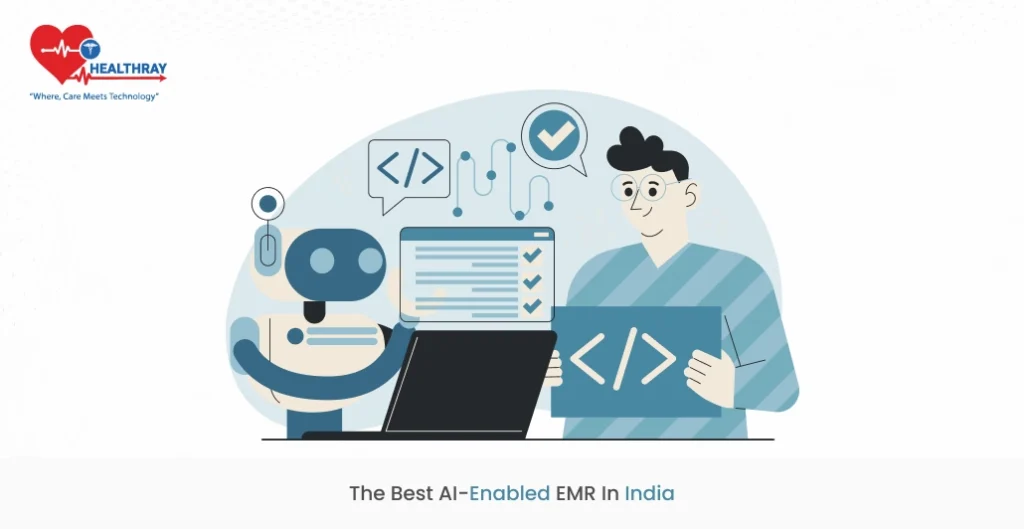
Healthray is the best AI-enabled EMR in India which has diverse functionalities for addressing healthcare challenges. This platform is designed after considering each specialist’s requirements with adherence to the entire medical regulation. Facilitate diverse integration such as laboratory management system, pharmacy management system, and different specialists. Incorporates different formulas such as EDD and EGA for increasing patient care. We aim to provide convenience to patients and healthcare specialists. It makes it easy to consult doctors from home and persistent monitoring of critical diseases. Also, This platform helps in receiving reminders regarding appointment timing and medicines.
Our software supports creating healthcare awareness in each corner of the country and enhances a healthier lifestyle. In the current landscape, it is crucial to adopt EMR Software in India to simplify the collection of medical documents and supporting medical data analysis. Most hospitals in India are already embracing EMR, it is time to implement it in your hospital and transform healthcare infrastructure. Also, It enhances patient care to the next level and maintains a high level of satisfaction with medical practitioners.
Conclusion
Artificial Intelligence in Electronic Medical Record changes the healthcare scenario and brings more changes in the medical industry. Facilitate patient portal for recording entire detailed patient information with vital signs. Ease in recording and maintaining medical billing transactions. Automated administrative tasks enhancing operational efficiency, patient quality care, and satisfaction with the medical department. Supports quick decision-making and enhanced environmental sustainability. Also, EMR software minimizes hospital expenses and increases revenue without requiring any additional investment.
